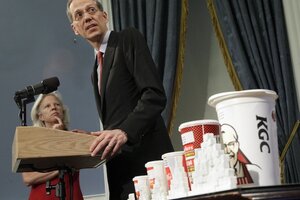Taking choice out of personal health
As more governments move to restrict personal choices as a way to cut costs, especially in health care, they can easily impinge on both liberty and alternative ideas about health.

New York City Health Commissioner Thomas Farley, accompanied by Deputy Mayor for Health and Human Services Linda Gibbs, address a news conference May 31, 2012, about Mayor Michael Bloomberg's proposed ban on the sale of large sodas and other sugary drinks in the city's restaurants, delis and movie theaters.
AP Photo
A local government in Britain proposed this week to withhold welfare payments and other benefits to obese people if they fail to exercise. It is the latest example of a government trying to save money by impinging on personal choices.
The British plan would rely on smart cards to track whether welfare recipients are using official health facilities, such as swimming pools and gyms. Benefits would be docked accordingly in hopes of reducing medical costs associated with obesity.
The idea is in the same league as New York City’s coming ban on the sale of sugary soft drinks larger than 16 ounces at restaurants, theaters, and food carts. The ban, which starts in March, aims to reduce the city’s high medical costs.
A related example is the recent consideration by dozens of states to require adult recipients of government benefits to pass a drug test – even with no evidence of such abuse. While only four states have approved a version of this idea – and courts are wary about endorsing the “unreasonable search” of a person’s body – states still see big savings in denying tax money to those who might use it to purchase drugs and harm themselves. (Many studies show the savings to states are elusive.) States should and often do deny benefits to those welfare recipients convicted of drug use.
The British plan to penalize the nonexercising obese is the type of drift toward “hard paternalism” that worries many people about the health-prevention aspects of America’s new Affordable Care Act (aka Obamacare). When government holds the power to withhold a key benefit, it may be tempted to use that power to nudge people toward certain lifestyle choices in order to save money.
So far, much of the law’s prevention efforts are benign, such as building exercise facilities, offering anti-smoking programs, or providing more medical screening.
But with budget-cutting negotiations on the horizon in Washington, political pressure is mounting to reduce the rapid rise in health costs by targeting so-called preventable conditions, such as obesity, or a person’s level of exercise.
“We don’t believe in individual freedom to the extent of letting people make poor health decisions and just wither away without help,” said Mick Cornett, the Republican mayor of Oklahoma City, which has a new public program called “This City Is Going on a Diet.”
Both governments and companies are inclined for now to use incentives to help people make better health choices rather than use penalties (more carrots than sticks, you might say). But even that requires a supposition on what constitutes health and what can maintain it. What about alternative means of health, such as prayer, used by millions of people? Will government intervene in some way on those different types of choices?
Preventive intervention requires extreme caution, not just for the sake of personal liberty but also because government itself can often make unwise choices.
The drive to improve health for all is a worthy goal, but that sentiment should not give free license to dubious methods of achieving it. Some ideas make clear sense, such as placing fruit at eye level in school cafeterias. Others, such as reducing benefits for overeaters, are a slippery slope toward assuming government cares more about individuals than individuals do about themselves – or that it always knows best.
Often a person’s choices – such as abusing drugs, smoking, and even overeating – do bring high costs to society. But means other than coercion must be considered to preserve personal integrity and to allow for different ideas about health.

